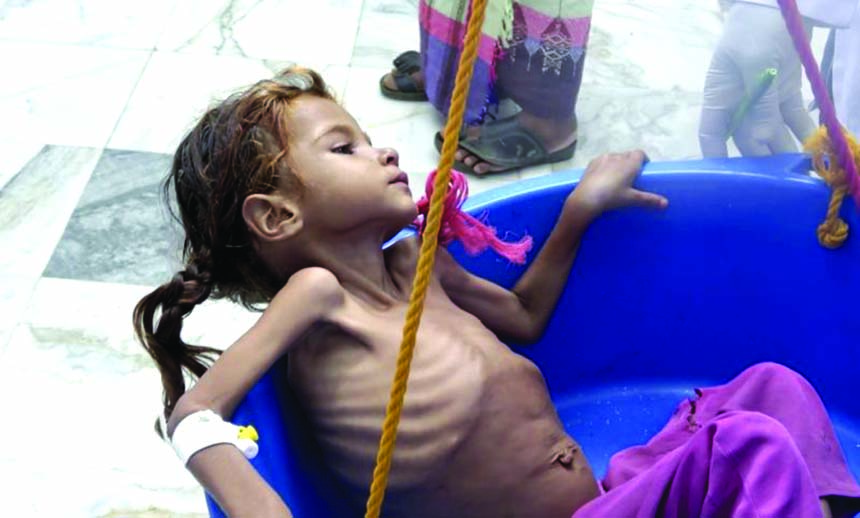
More than five million children are at risk of famine in Yemen as the ongoing war causes food and fuel prices to soar across the country, charity Save the Children warned Wednesday.
Disruption to supplies coming through the embattled Red Sea port of Hodeida could “cause starvation on an unprecedented scale,” the British based NGO said in a new report.
Save the Children said an extra one million children now risk falling into famine as prices of food and transportation rise, bringing the total to 5.2 million.
Any type of closure at the port “would put the lives of hundreds of thousands of children in immediate danger while pushing millions more into famine,” it added.
Impoverished Yemen has been mired in deadly conflict between Shiite Huthi rebels and troops loyal to President Abedrabbo Mansour Hadi since 2014.
A Saudi-led alliance intervened in 2015 in a bid to bolster the president, accusing Iran of backing the Huthis, but nearly 10,000 people have since been killed.
Deadly clashes resumed around the Huthi-held port city of Hodeida following the collapse of talks in Geneva earlier this month.
“Millions of children don’t know when or if their next meal will come,” said Helle Thorning-Schmidt, CEO of Save the Children International. “In one hospital I visited in north Yemen, the babies were too weak to cry, their bodies exhausted by hunger.
“This war risks killing an entire generation of Yemen’s children who face multiple threats, from bombs to hunger to preventable diseases like cholera,” she added.
The United Nations has warned that any major fighting in Hodeida could halt food distributions to eight million Yemenis dependent on them for survival.
Saudi Arabia and its allies accuse the Huthi rebels of smuggling arms from Iran through Hodeida and has imposed a partial blockade on the port.
The Huthis and Iran both deny the charges.
Yemen has been devastated by a conflict that escalated in early 2015, when Houthi rebels seized control of much of the west of the country and forced President Abdrabbuh Mansour Hadi to flee abroad.
Alarmed by the rise of a group they saw as an Iranian proxy, the UAE, Saudi Arabia and seven other Arab states intervened in an attempt to restore the government.
What impact has this had on people?
The war has led to severe delays in paying the salaries of teachers and public servants, with some people receiving no wages for almost two years.
Those who are paid face food prices which are 68% more expensive than when the war began.
Meanwhile, the Yemeni Riyal has lost almost 180% of its value over the same period, according to Save the Children.
Earlier this month, the currency reached its lowest value in history, placing a further burden on population.
Fears also remain of potential damage to or a blockade of Hudaydah’s port as a result of the fighting.
The basic supplies that pass through it are needed to prevent famine and a recurrence of a cholera epidemic that affected a million people last year.
“Millions of children don’t know when or if their next meal will come,” the chief executive of Save the Children International, Helle Thorning-Schmidt, said.
“In one hospital I visited in north Yemen, the babies were too weak to cry, their bodies exhausted by hunger.
“This war risks killing an entire generation of Yemen’s children who face multiple threats, from bombs to hunger to preventable diseases like cholera,” she added.
Earlier this month, Save the Children said it had treated almost 400,000 children under the age of five for severe malnutrition so far in 2018, warning that more than 36,000 children could die before the end of the year.
Almost 10,000 people – two-thirds of them civilians – have been killed and 55,000 others injured in the fighting, according to the United Nations.

